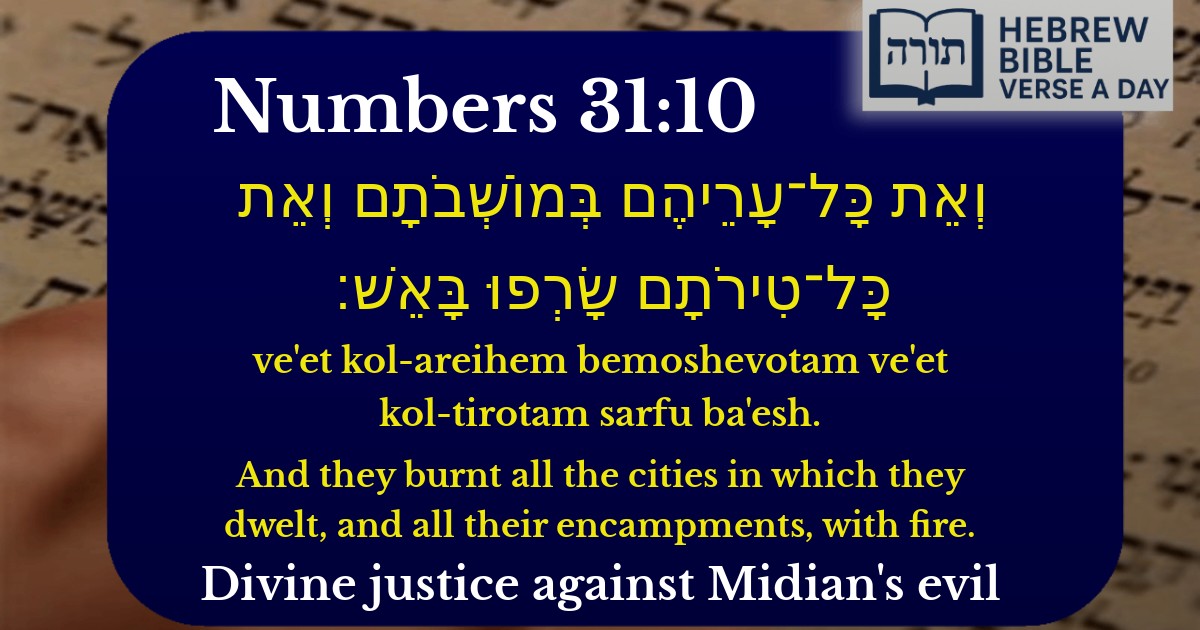Frequently Asked Questions
Q: What does Numbers 31:10 mean when it says the Israelites burned the cities and encampments?
A: This verse describes the aftermath of the battle against Midian, where the Israelites were commanded to take vengeance for the harm Midian caused (Numbers 31:2). Burning the cities and encampments was part of ensuring that no trace of Midian's influence or idolatry remained, as they had led Israel astray (Rashi on Numbers 31:2).
Q: Why did the Israelites burn the Midianite cities instead of keeping them?
A: According to Jewish tradition, the Israelites burned the Midianite cities to eliminate any remnants of idolatry and immoral practices that could spiritually harm the Jewish people (Rambam, Mishneh Torah, Hilchot Avodat Kochavim 7:1). Additionally, the spoils were purified through fire (Numbers 31:22-23), showing the importance of removing impurity.
Q: What lesson can we learn from Numbers 31:10 about dealing with negative influences?
A: The Torah teaches that harmful influences—whether spiritual, moral, or physical—must be completely removed to prevent future damage (Talmud, Avodah Zarah 52b). Just as the Israelites burned Midianite encampments, we must distance ourselves from negative influences in our lives.
Q: Does this verse justify destroying property in war?
A: This was a specific commandment from Hashem for this battle against Midian (Numbers 31:2) and not a general rule for warfare. Jewish law (Halacha) regulates war ethics, including when destruction is permitted (Rambam, Hilchot Melachim 6:1-7). Normally, unnecessary destruction is prohibited (Deuteronomy 20:19-20).


Context in the Torah
This verse appears in Bamidbar (Numbers) 31:10, describing the actions of Bnei Yisrael after their battle against Midian. The destruction of the Midianite cities and encampments was carried out in accordance with Hashem's command to Moshe (Bamidbar 31:2). Rashi explains that this was a punitive measure due to Midian's role in leading Bnei Yisrael astray through the incident of Ba'al Peor (Bamidbar 25:1-9).
Halachic and Moral Considerations
The Rambam (Hilchot Melachim 6:4) discusses the laws of warfare, noting that when engaging in a milchemet mitzvah (obligatory war), such as the war against Midian, the destruction of enemy strongholds is permitted to prevent future harm. However, the Talmud (Sanhedrin 105b) emphasizes that such actions must be measured and purposeful, not wanton destruction.
Symbolism of Fire
The Midrash (Bamidbar Rabbah 22:4) comments on the use of fire, suggesting it symbolizes purification. Just as fire refines metal, the burning of Midian's dwellings served to eradicate the influence of their idolatry and immorality. The Sforno adds that this act ensured no remnants of their corrupt culture would remain to tempt Bnei Yisrael.
Lessons in Spiritual Warfare